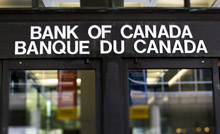
Bank of Canada governor Stephen Poloz says tighter regulations on the financial sector were a no-brainer in the aftermath of the 2008-09 global crisis but there now needs to be enough breathing room for “natural” market forces to blossom.
In a speech Thursday to the Economic Club of New York, Poloz spoke of a future where banks played a reduced role. Therefore, he said, regulators should allow enough space for new ways to fill funding gaps and ensure prosperity.
“A return to sustainable economic growth around the world will require continued financial innovation,” said Poloz in a speech titled “Speculating on the Future of Finance.”
“Regulation must allow these natural forces to manifest themselves, albeit in a safe way.”
Poloz’s speech explored several different areas where he said the “forces of competition” might emerge under the new regulatory regimes: private lending and equity, public finance and market-based finance, or shadow banking.
He brainstormed how leaving some wiggle room for market-based financing could lead to an expanded role for securitization, a process that the International Monetary Fund describes as pooling certain types of assets – such as residential and commercial mortgages, auto loans or credit card debt – so that they can be repackaged into interest-bearing securities. The assets’ interest and principal payments are then passed along to the buyers of the securities.
Poloz acknowledged that securitization became a “tainted word” during the financial crisis when, according to the International Monetary Fund, the quality of those underlying assets unexpectedly deteriorated, taking investor confidence with it.
“I can imagine a new class of high-quality, low-risk securitization products could differentiate itself from the mistakes of the past,” he said.
When Poloz was later asked by a reporter why he decided to encourage more securitization, he said his remarks were meant to be speculative, but that he believes it has a place.
“I think it has to be an important feature of the landscape and what we need is for it to develop in a way which does not pose significant risks,” Poloz said.
“That means that companies can get what they need to grow the economy without putting anything substantially in danger, given the principles behind our financial supervision. So, that’s the ideal outcome.”
Finn Poschmann of the C.D. Howe Institute think-tank said securitization markets “just went absolutely through the floor” during the crisis and are now starting to come back to life.
He said for more than a decade they’ve been key components of the economy.
But Poschmann isn’t so sure whether securitization will escape a strong international push for more regulation from places like Europe and the G20.
“In this world of growing scope of regulation, is it possible to have a flourishing sector?” Poschmann asked. “So, there’s a conflict there.”
In his speech, Poloz noted how the market structures he mentioned already exist. So, he said he’s also pondered about other possible financial-system options that could still be out there.
“Does anybody here besides me wonder what the banking system looks like in the background of Star Trek?” Poloz said.
“Like, I seriously wonder about that.”
Poloz also spoke about the importance of rebuilding the public’s trust.
He recalled how the financial crisis destroyed over 60 million jobs worldwide and, by the end of last year, it had led to a cumulative loss in global output of roughly $10 trillion, or close to 15 per cent of the world’s gross domestic product.
“Financial regulation — it’s costly — but that cost pales compared with the fallout from the economic and financial crisis,” he said.
“We’re still paying for that. Global regulatory reform was absolutely essential.
“So, let’s work to make it better.”
The Bank of Canada governor said the core of the world’s financial system is far safer today, even though some issues must still be addressed.
Poloz also credited the resilience of Canada’s financial system in helping the country emerge from the financial crisis in better shape than most countries.
“Even so, we saw significant destruction in our export sector, the backbone of our economy,” Poloz said.
He added, however, that Canada has seen signs of increasing exports, business investment and job creation, though he noted it will likely take another couple of years before the economy will have steady growth with inflation on target.